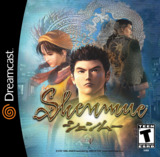Shenmue has bad controls and features elements as exciting as waiting for the bus and getting a job. It is still good.
The ambition here was clearly to build a fully realized and realistic world and succeeds as far as was possible on the Dreamcast in 1998. This is to say, given the limited technology at the time, it is truly impressive how open and detailed the world is but it also leaves a lot to be desired looking at it nearly a decade and a half in the future. Realistic graphics never age well, while it is impressive they voiced every single line of dialog, video games had not yet started pulling voice actors of even a reasonable level of skill at that point. There is also the fact that the adventure isn't really open ended. There is a lot of a exploration to be done but there is a fairly strict patch from point A to point B involved.
Point A in this case is an intense opening cut scene in which the main character, Ryo, watches his father get killed by a martial arts master named Lan Di. The plot veers immediately towards Ryo's quest to learn more about his father's killer and eventually avenge his death. To get there Ryo relies on his strength as a fighter and through his investigative skills. His investigative skill boils down to his willingness to walk around town day after day, asking various residents questions until he finds what he needs to know. A lot of gameplay feels quite a lot like those sections of RPGs where you find yourself in some town looking for the right person to talk to you who sends you along to the next person and so on. Only since the goal here is to be as realistic as possible, you can't just expect everyone to be standing around in the same place all day and all night so you frequently have a few hours to kill before you move on to the next person. This might seem like a boring way to go about avenging your father's death but there really is quite a lot to explore in the meantime.
For starters, you can just talk to even more people but while it is amusing that literally every single character in this game has something to say, eventually it gets pretty tedious listening to people's excuses as to why they can't talk just then. Among other things, you can feed a stray cat, buy toys from vending machines and--my favorite--play video games at the arcade. The very fact that Yu Suzuki included these things shows the kind of focus on realism that truly makes this game special. There are even some elements that are almost too realistic. You have to wait for the bus and can accidentally dial the wrong number on a telephone. You have a curfew which must be strictly adhered to. Towards the end of the game, you get a job operating a fork lift and have to go for five in-game days in a row where you basically load crates the whole time. This struck me at a few points as a strange way to spend my free time but overall the experience was enjoyable nonetheless.
As far as more action oriented areas, there are a few where you just press buttons in a specified order as they appear on screen. The real meat of the action though is the fighting system which is fairly well developed. The fights are mostly pretty easy, esp. once you get a hang of the dodge button but they're still pretty varied and fun. One of the best sections in the whole of the game is a beat-em-up style brawl towards the end of the game and it really makes you wish there was more of that. The controls for fighting are quite good, well developed while still being simple and accessible. The controls for walking around town are one of my main bones to pick w/ this game, however. You use the Dreamcast's uncomfortable d-pad to walk around and hold down one of the shoulder buttons to run. You can look around using the analog stick, which is great, but one must wonder's why a designer of the caliber of Suzuki didn't see fit to map run and walk to the analog stick.
I could probably spend a whole day listing off my complaints about this game but it's not bad in the end. It probably falls short of what it intended to to but the mere fact that it was shooting at the target it was is what makes Shenmue noteworthy. It is a game that fairly well drips w/ an audacity of ambition and there is something about it that drags you in and makes you keep playing despite its numerous flaws. If you are one to sit there and nitpick a games flaws, you will probably go nuts wrestling w/ this games controls and listening to the voice acting. If you want to get taken away w/ the past's version of the future, this is one of the first games you should look to.

